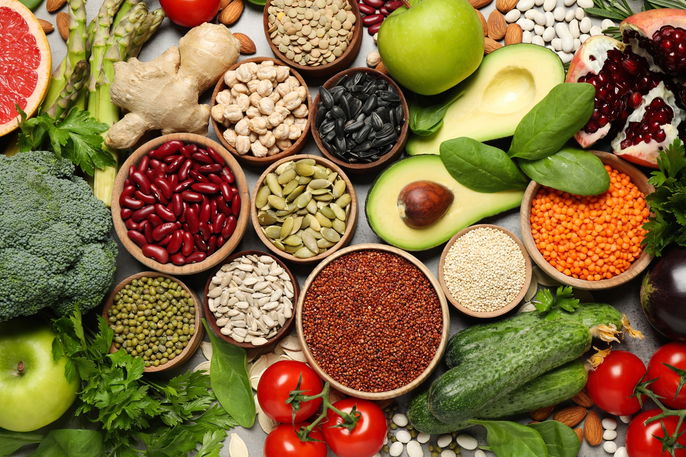Postpartum diets can vary depending on whether the mother is breastfeeding or not. Generally speaking, a postpartum diet should be balanced and include vegetables, fruit, whole grains and lean meatus. This will help with postpartum weight loss and prevention of other common problems, like vitamin or mineral deficiency, obesity or diabetes.
Breastfeeding women should consume more than 1800 calories per day to ensure adequate milk production. This group of women should also avoid consuming caffeine, alcoholic drinks or raw foods (as raw foods can cause cramping and other discomfort in the baby).
Women who do not breastfeed do not need such a high calorie diet, however their intake should be balanced to aid in postpartum weight loss and prevent problems like constipation, obesity or diabetes.
To ensure your diet is adequate for your health and health goals, you should see a registered dietitian to evaluate your needs.

What to eat after pregnancy
Although there are no specific recommendation for postpartum nutrition, you should opt for foods that prevent inflammation and help to speed healing after normal labor or a c-section.
You are advised to opt for a diet that is rich in foods with healing properties such as:
- Protein, like tofu, milk, dairy products and eggs - see a list of other high-protein foods
- Omega-3, like fish and seaweed - see a list of other omega-3 foods
- Iron, like chicken and beans - see a list of other high-iron foods
- Antioxidants, like carrots, blackberries, tomatoes, arugula, and oranges
These foods help with collagen formation to help open wounds or incisions scar-up. Foods with antioxidant properties help to prevent inflammation that can occur in the postpartum phase.
Adequate hydration is also an important factor in postpartum recovery. Women should aim to drink at least 2 L of water per day, which can include teas.
What to eat when breastfeeding
When breastfeeding, it is important for mothers to maintain a varied and balanced diet to ensure adequate milk production and to prevent malnutrition or weight gain.
Breastfeeding women should prioritize foods like:
- Fresh veggies, like tomatoes, lettuce, pumpkin, onions and celery
- Fresh fruits, like mango, guava, banana, oranges, melon or apples
- Whole grains, like whole wheat pasta, whole wheat rice, corn or quinoa
- Legumes, like beans, peas, chickpeas or lentils
- Lean protein, like chicken, tofu, eggs, fish or seafood
- Dairy, like milk, cheese or yogurt
- Tubercles, like potatoes or sweet potatoes
- Healthy fats, like olive oil, coconut oil, chia seeds or pumpkin seeds
These foods are rich in vitamins, minerals, fiber and protein, which are important to prevent nutritional deficiencies and help with baby development. If you notice any colic or cramping in the baby after eating a specific food, speak to your doctor or pediatrician and avoid consuming it in the meantime.
It is also important to drink plenty of water to ensure adequate hydration, as water is essential for the breastmilk production.
What to avoid after pregnancy
Some foods that can delay healing or lead to weight gain after pregnancy include:
- High-fat foods, like fried food, pizza, bacon or salty snacks
- Refined sugar, like candy, soda, juices, ice cream or chocolate
- Processed foods, like salty packaged snacks, cookies and fast food
- Sausages, cold cuts and salami
Alcoholic beverages, like beer, wine and champagne, should also be avoided due to their high calorie content. They can make weight loss more difficult.
Foods to avoid when breastfeeding
When breastfeeding, women should avoid high fat foods with refined sugar, processed food and sausages. It is also important to avoid raw food, like unpasteurized dairy, oysters, undercooked meat or fish, as they can cause intestinal infections that affect breast milk production.
It is also to regulate caffeine intake, by consuming green tea, yerba mate, black tea or coffee in moderation. Coffee should be limited to 2 cups per day, as the caffeine can be absorbed into breast milk and cause agitation and sleep disturbances in the baby.
Alcoholic drinks, like wine, champagne or beer, should also not be consumed when breastfeeding, as the alcohol can also be absorbed by the baby and affect the baby’s health.
Read more about foods to avoid when breastfeeding.
Postpartum weight loss
It is normal to gain weight during pregnancy, although many women hope to lose it in the postpartum phase. Women will usually lose 4 to 5 kg (about 8 to 11 lb) in the first 6 weeks of postpartum, which makes up for the baby’s weight as well as fluids and other tissue accumulated during pregnancy.
The rest of the weight can take about 3 months to lose. However, weight loss should be gradual, as restrictive diets can lead to malnutrition and problems with breastmilk production.
To lose postpartum weight in a balanced and healthy way, it is important to maintain a varied diet and to engage in moderate physical activity, as advised by your doctor.






























